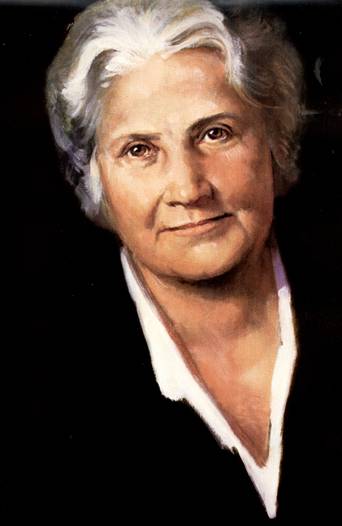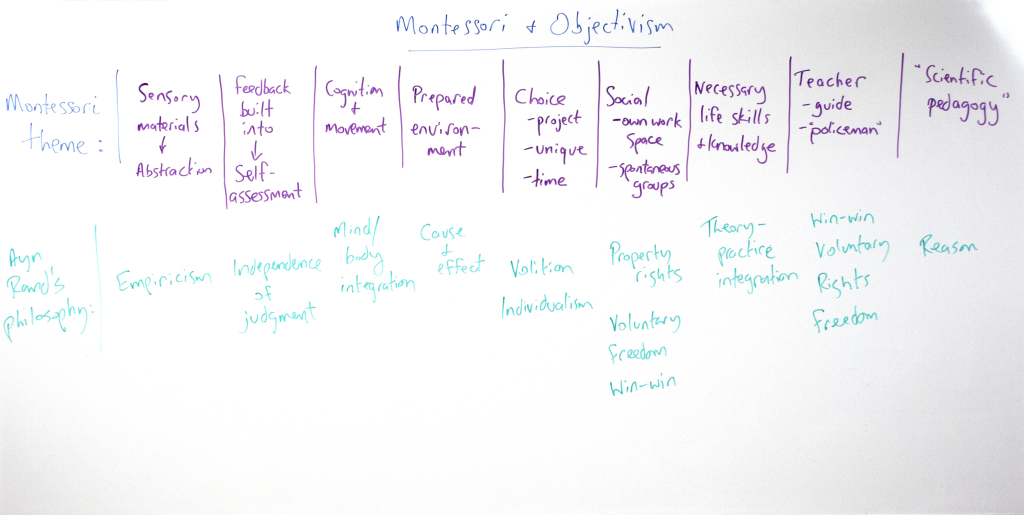Maria Montessori (1870–1952) was an Italian educator and theorist whose system of “scientific pedagogy” led to the development of Montessori schools worldwide. Some resources:

* My 38-minute video overview of Montessori education.
* My 2.5 hour video lecture on Objectivism and Montessori, which is Part 12 of my Philosophy of Education course.
* Montessori versus traditional schools: Rathunde and Csikszentmihalyi’s study.
* Montessorium site. “Higher Ground is a growing network of Montessori schools, trainings, and services. Montessorium is the think tank of that network. It is a research project, premised on diving deep the philosophy of Montessori and offering it a fresh articulation.”
* A Wall Street Journal blog post, “The Montessori Mafia”: “the Montessori educational approach might be the surest route to joining the creative elite, which are so overrepresented by the school’s alumni that one might suspect a Montessori Mafia: Google’s founders Larry Page and Sergei Brin, Amazon’s Jeff Bezos, videogame pioneer Will Wright, and Wikipedia founder Jimmy Wales, not to mention Julia Child and rapper Sean ‘P. Diddy’ Combs.” Related: Larry Page and Sergey Brin discuss their experience as Montessori students.
* Angeline Lillard’s excellent book on the evidence for and against Montessori: Montessori, The Science behind the Genius (Oxford University Press 2007).
* Marsha Enright’s biographical essay on Maria Montessori, “Foundations Study Guide: Montessori Education”, interview about Montessori with Professor Kevin Currie-Knight, and Montessori-related posts at her blog, Liberating Education.

* Screen shot of the parallels between Montessori practices and Objectivist philosophy. (Click to enlarge. Context here.)
* Video interview with Professor Jerry Kirkpatrick on Montessori and Dewey, in which we discuss Kirkpatrick’s fine book, Montessori, Dewey, and Capitalism.
* Sugata Mitra on child-driven education: Mitra’s TED on children’s natural initiative, the Internet, and what can be done without teachers. Thematically, Mitra’s fun talk is very Locke, Montessori, and, at the end, Hayek.
* A Maria Montessori page at Facebook for ongoing links and news.
* Deb Chitwood’s DIY Montessori Materials site.
Return to the Philosophy of Education page.
Thanks so much for posting this. Now I realized the importance of being Montessori-consistent in both school and home.
Hello,
Someone suggested I might be interested in The Comprachicos. I put a piece on American Thinker about it, titled “K-12: How our schools make monsters,” with a link to your site. It got a good response from AT readers.
Here’s what I’m most struck by. Rand analyzed Progressive education more deeply than anyone I’ve seen, and all the way back in 1970. But her analysis was buried in 17,000 words that very few people could get through or understand. I have to wonder if anybody grasped what she was saying.
I understand education very well at the classroom, practical, or operational level. So, for what it’s worth, I want to endorse Rand’s thinking 100%, and suggest that you harp on it some more. She pulverized Progressive education, blasted it into little pieces, and fed them to dogs in the street.
It would be very helpful if more people understood her critique, not at some exalted philosophical level but at the level of what Progressive education does to the lives of 8-year-olds and 12-year-olds. I see this as a great way to attack our Education Establishment.
Good luck with your ambitious project,
Bruce Deitrick Price
Hi Bruce: Do you have a link to your piece at AT?
K-12: How our schools make monsters
https://www.americanthinker.com/articles/2018/04/k12_how_our_schools_make_monsters.html
PS: The one on Friday–“K-12: Let the peasants eat popcorn”– deals with the problem that even as our public school system declines, our upper-class and nominal leaders stand aside passively or indifferently. The article is an attempt to make these people feel guilty. Good luck on that.